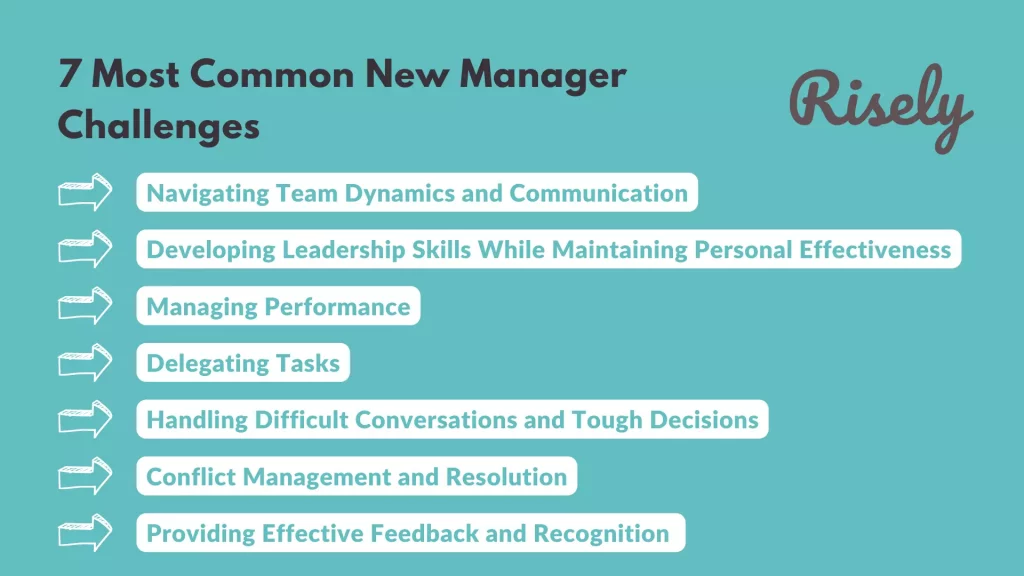7 New Manager Challenges And How To Beat Them
Congratulations on your promotion to a new manager role! It’s an exciting time but it can also come with several challenges. Unfortunately, many hurdles can be overcome, from navigating team dynamics and communication to managing performance and delegating tasks. But don’t worry. In this blog post, we’ll explore the five most common challenges new managers face and how you can beat them. We’ll provide practical tips on developing leadership skills, maintaining personal effectiveness, handling difficult conversations and tough decisions, and much more. By the end of this blog post, you’ll be equipped with the knowledge and tools needed to succeed as a new manager.Understanding the Challenges of Being a New Manager
Stepping into a new managerial role is a big challenge, and there are several obstacles that new managers may face. One of the most common challenges for new managers is managing former peers, which requires setting boundaries and establishing a new dynamic with former colleagues. Building credibility is another significant challenge new managers face, which can be achieved by setting clear expectations and following through on commitments. Delegating tasks appropriately while maintaining accountability for results is also essential to being a successful manager. Conflict resolution, too, is a crucial part of managing teams effectively. Developing strong communication skills and resolving conflicts fairly and constructively will help you navigate these situations smoothly. Lastly, managing time and priorities can be overwhelming for new managers. Prioritizing tasks and delegating effectively can help make the most of their time to overcome this challenge. By understanding these challenges and developing strategies to beat them, new managers can set themselves up for success.The unique challenges of new managers
Becoming a new manager can be a challenging experience. One main challenge new managers face is finding the right balance between delegating tasks and managing their workload. In addition, they may struggle with conflicts between team members or addressing performance issues. Effective communication with team members is crucial for new managers as it helps to build relationships and establish trust. However, this takes time and effort. To overcome these challenges, it’s essential for new managers to seek guidance from experienced mentors or attend leadership training to develop their skills. Doing so can teach them how to delegate tasks effectively, resolve conflicts, and communicate with their team members. Some of the most common challenges faced by new managers are-7 Most Common New Manager Challenges

#1 Navigating Team Dynamics and Communication
As a new manager, navigating team dynamics and communication can be challenging. Miscommunication and confusion can arise if expectations and goals are not clearly set. On the other hand, encouraging open communication and feedback can create a positive work environment that fosters collaboration and creativity. Addressing conflicts within the team promptly and fairly is also essential to maintain a healthy work culture. Developing strong leadership skills to inspire and motivate your team is critical for success as a manager. In addition, continuously evaluating and adjusting your management style to meet the needs of your team members will help you overcome any challenges that may come your way.Building trust and relationships with team members
Navigating team dynamics and communication can be one of the major challenges of new managers. Building trust and relationships with team members is crucial for effective management in this aspect. Active listening, empathy, and transparency are all important factors in establishing trust with team members. Regular communication and feedback can also foster positive relationships within the team. Investing time in team-building activities can help establish a positive team culture conducive to open communication and collaboration. Finally, it’s essential to recognize and address any conflicts or issues that arise promptly and respectfully to maintain a healthy work environment.Effective communication strategies for new managers
New managers should establish open lines of communication with their team members and implement active listening, regular check-ins, and clear expectations to prevent misunderstandings. To navigate team dynamics successfully, new managers must understand each team member’s communication style and adapt as needed. Encouraging feedback and addressing conflicts promptly can also improve team dynamics.Other Interesting Reads
#2 Developing Leadership Skills While Maintaining Personal Effectiveness
As a new manager, developing leadership skills needs to go hand in hand with maintaining personal effectiveness. It can be challenging to balance leadership responsibilities with your personal workload. Navigating interpersonal conflicts and managing team dynamics requires strong communication skills. Effective delegation and trust in your team’s abilities are essential for success. Adapting to a new management style and learning to motivate and engage employees can be difficult. Developing time-management skills is necessary to prioritize tasks, stay organized, and focus on what’s important. As you progress as a manager, focus on growing your leadership skills while maintaining your effectiveness – this will be key to tackling any challenge that comes your way. Automated AI-enabled tools like Risely can help new managers develop these skills big time! Risely is the AI copilot for all people management challenges that strike managers. With the help of interactive features like nudges and regular assessments of key abilities, Risely helps you reach your full potential – one step at a time. Get started on this journey today with Risely.Time management tricks for new managers
Developing strong leadership skills while maintaining personal effectiveness can be one of the major challenges for new managers. One crucial component of personal effectiveness is time management. New managers must prioritize tasks and create schedules to stay organized and focused. Delegating responsibilities to team members can also free up time for more critical tasks. Multitasking should be avoided as it often leads to decreased productivity and increased stress levels. Instead, focus on one task at a time and give it your full attention. Taking breaks throughout the day can help maintain energy levels and increase overall productivity.How to set clear goals and expectations for your team?
One key aspect of effective team management is setting clear objectives and expectations. It’s important to define the team’s purpose, objectives, and expected outcomes in a way that all team members easily understand. It can help ensure that everyone is aligned toward the same goals. Regularly reviewing progress towards these goals and providing constructive feedback to your team members can also help keep everyone on track. Additionally, it’s important to ensure that each team member understands their role and how it contributes to the team’s overall success. Finally, setting clear goals and expectations can help your team work more efficiently and effectively toward achieving your shared objectives.#3 Managing Performance
One of the biggest challenges of new managers face is maintaining performance. It is essential to set clear expectations and goals for your team so they know what they are working towards. Regular feedback and coaching help to improve the team’s performance, and it’s essential to develop a performance management system that rewards good performance while addressing poor performance. A culture of accountability should be created where everyone takes ownership of their work. It’s crucial to address performance issues promptly and fairly so they don’t become more significant problems. If an employee is not meeting expectations, it’s essential to identify the reasons behind it and create an improvement plan. Ultimately, being a manager involves balancing recognizing your employees’ strengths and weaknesses, motivating them toward better outcomes, and creating an environment where everyone can thrive.Best practices to maintain employee performance
To maintain high-performance levels, it’s important to establish clear expectations and goals from the start. Regular positive and negative feedback is also essential to help employees stay on track. In addition, offering training and development opportunities can help employees improve their skills and contribute even more to the team. In addition, recognizing and rewarding employees who consistently meet or exceed expectations can go a long way in maintaining their motivation and dedication. Finally, when team performance issues arise, addressing them promptly and relatively using a constructive approach that focuses on improvement rather than punishment is essential. By following these best practices, new managers can successfully manage employee performance and drive better results for their team.
#4 Delegating Tasks
Delegating tasks can be challenging for new managers but essential for team success. As a new manager, you should identify tasks that can be delegated and match them with the skills and interests of your team members. Communicate clearly with team members about their responsibilities and expectations to ensure they understand their expectations. Providing support and guidance as needed is essential, but avoid micromanaging as this can demotivate your team members. Instead, regularly evaluate the effectiveness of delegation and adjust as necessary to optimize results. Effective delegation helps you get more done but also enables you to develop your team’s skills, which will benefit everyone in the long run.Tips for delegating effectively as a new manager
Delegating tasks can be challenging for new managers, but it’s an essential skill to master. Effective delegation lets you focus on more strategic tasks while helping your team members develop their skills. To delegate effectively as a new manager, it’s essential to follow these tips:- Be clear about the task’s goals, expectations, and deadlines
- Choose the right person for the job based on their skills and interests
- Provide adequate support and resources to ensure success
- Follow up regularly to monitor progress
- Assess your delegation skills
#5 Handling Difficult Conversations and Tough Decisions
One of the most challenges for new managers is handling tough conversations and making difficult decisions. It can be daunting, but it’s essential to communicate clearly with the person involved and try to understand their perspective actively. Being empathetic while making firm decisions is crucial in such situations. During the conversation, try not to let emotions get the better of you and maintain professionalism. After discussing the matter, follow up with action steps and monitor progress toward a resolution. Again, communication is key, so keep an open dialogue with your team members as you work towards overcoming any challenges together.Strategies for having difficult conversations with team members
As a new manager, handling difficult conversations and making tough decisions can be some of the most challenging aspects of the job. However, it’s important to remember that avoiding these conversations can lead to more significant issues down the line. To effectively manage difficult conversations, it’s essential to have a strategy in place. It can include outlining your goals and points in advance, using active listening techniques to understand the other person’s perspective, and remaining calm and professional even if the conversation becomes tense or emotional. Once the conversation is over, follow up with a clear action plan or next steps. It will ensure that both parties are on the same page moving forward. With these strategies in place, new managers can effectively navigate challenging conversations and confidently make tough decisions.How to make tough decisions as a new manager
One of the biggest challenges for new managers is making tough decisions and handling difficult conversations with team members. To make effective decisions, gathering all relevant information and carefully considering the potential impact on your team and organization is important. Take time to listen to differing opinions and viewpoints from your team members before making a final decision. When communicating your decision, be sure to do so clearly and transparently. Acknowledge any negative impacts it may have and be prepared to address any concerns or questions that may arise. It’s essential to stay confident in your ability to make tough decisions, remains open to feedback, and learn from mistakes.#6 Conflict Management and Resolution
As a new manager, effectively managing and resolving conflicts within your team is a crucial skill to develop. Conflicts can arise due to differing opinions, personality clashes, or misunderstandings. Unresolved conflicts can reduce productivity, morale and a negative work environment. However, addressing conflicts promptly and constructively can lead to improved team cohesion and a healthier work atmosphere.Understanding the Sources of Conflict
One of the primary challenges in conflict management is identifying the sources of conflict. It’s important to recognize that conflicts can stem from various factors, such as miscommunication, differing expectations, competition for resources, or personal differences. As a new manager, take the time to understand the underlying causes of conflicts within your team.Implementing Conflict Resolution Strategies
New managers should have a toolkit of conflict resolution strategies to draw from. When conflicts arise, approach the situation objectively and avoid taking sides. Consider using strategies like negotiation, compromise, and finding common ground. Mediation can be effective when conflicts involve multiple parties. If needed, involve HR or senior management to ensure a fair resolution. Encourage those involved to focus on the issue and work collaboratively towards a solution that benefits everyone.#7 Providing Effective Feedback and Recognition
As a new manager, providing effective feedback and recognition is vital for employee growth and motivation. Constructive feedback helps employees understand their strengths and areas for improvement, while recognition acknowledges their contributions and boosts morale. Striking the right balance between feedback and recognition can positively impact team performance and engagement.Delivering Constructive Feedback for Growth
New managers often find providing constructive feedback challenging. To overcome this:- Start by setting a positive tone and creating a private and comfortable discussion environment.
- Be specific about your behavior or task, and provide examples to illustrate your points.
- Focus on the issue at hand, avoiding personal attacks.
- Use the “feedback sandwich” approach, sandwiching the constructive feedback between positive comments.
- Collaborate with the employee to set achievable goals and provide support for improvement.
Recognizing and Rewarding Contributions
Recognizing and rewarding your team’s efforts is equally important. Acknowledge achievements publicly to highlight the value employees bring to the team. Tailor recognition to individual preferences – some might prefer public praise, while others appreciate a private thank-you. Consider implementing a formal recognition program that includes awards, certificates, or other incentives. Also, involve your team in recognizing each other’s accomplishments, fostering a culture of peer-to-peer appreciation. By honing your feedback and recognition skills, you can create a positive feedback loop that encourages continuous improvement and helps your team members feel valued and motivated.Conclusion
Being a new manager can be challenging, but also an opportunity to grow and develop your leadership skills. As you navigate team dynamics, communication, performance management, delegation, and tough decisions, remember you’re not alone. Many other managers have gone through the same struggles and become stronger on the other side. By following best practices and being open to feedback and learning opportunities, you can overcome these challenges and thrive in your new role.Are you ready to take on the challenges of a new manager?
Find out now with Risely’s leadership skill assessments for managers and leaders to unleash your full potential.
FAQs
What are the seven challenges of being a manager?
Some common challenges for new managers are:
– Meeting performance expectations
– Managing time and priorities
– Managing and resolving conflicts
– Managing change and uncertainty
– Developing and retaining talent
– Communicating effectively
– Managing relationships with superiors, peers, and subordinates.
– Meeting performance expectations
– Managing time and priorities
– Managing and resolving conflicts
– Managing change and uncertainty
– Developing and retaining talent
– Communicating effectively
– Managing relationships with superiors, peers, and subordinates.
What is a difficult challenge for a manager?
One of the most difficult challenges for managers is managing and resolving conflicts. This involves understanding the root causes of the conflict, communicating effectively with all parties involved, and finding a solution that is acceptable to all. Conflict resolution requires strong interpersonal and communication skills, as well as the ability to remain neutral and objective.
What challenges do leaders face?
Leaders face a range of challenges, including managing change, developing a vision and strategy, inspiring and motivating others, building and maintaining relationships, and managing risks and uncertainties. They must also balance competing demands and priorities, make difficult decisions, and adapt to changing circumstances.
What do first time managers need to know?
First-time managers need to know the basics of effective management, including setting clear expectations, communicating effectively, delegating tasks, managing time and priorities, providing feedback and recognition, and developing talent. They should also understand the importance of building relationships, managing conflicts, and leading by example. First-time managers should seek out mentorship and support, and be willing to learn from their mistakes.
Other Related Blogs
Read this if you think you can run The Bear
Read this if you think you can run The Bear What if your favorite mom-and-pop deli is transformed into something high-end super quick? We are talking of The Bear, Carmy,…
New Managers and Small Teams: A Match Made Not Made In Heaven
New Managers and Small Teams: A Match Made Not Made In Heaven My team currently has nine people, including myself. That sounds pretty simple, right? After all, exactly how much…
Top 10 New Manager Skills That You Must Learn
Top 10 New Manager Skills That You Must Learn Congratulations on your promotion as a new manager! It’s a big transition and can be challenging. You may have been an…
5 Ways of Coaching for New Managers in the Age of AI
5 Ways of Coaching for New Managers in the Age of AI In today’s rapidly evolving business landscape, new managers face unique challenges. Not only do they have to adapt…


